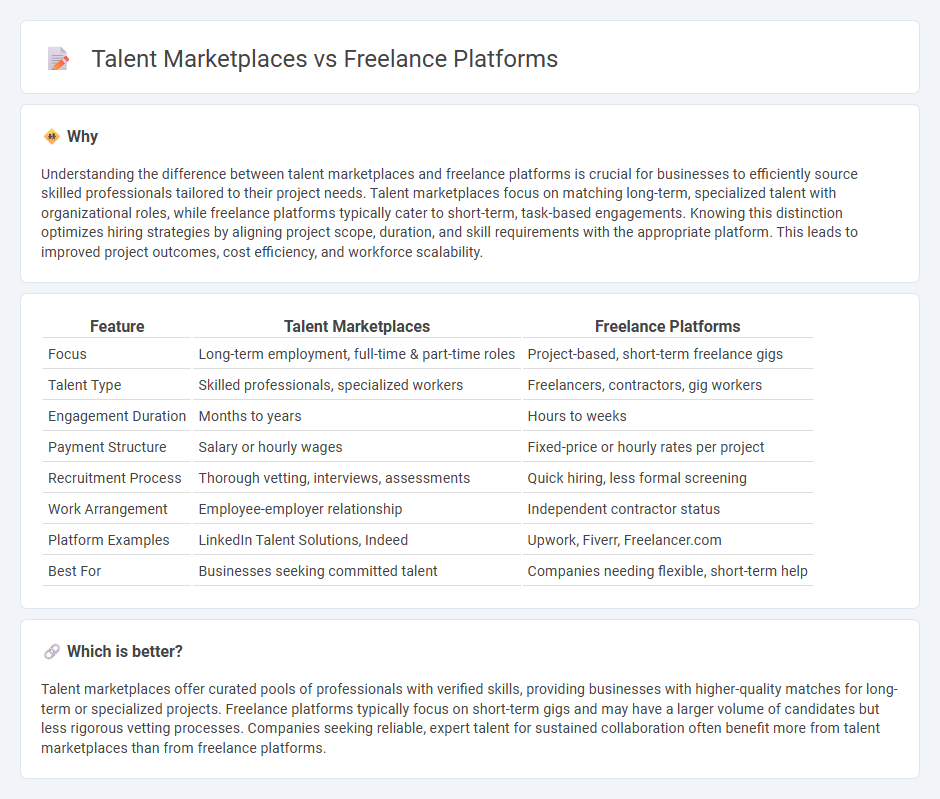
Talent marketplaces connect organizations with skilled professionals for long-term projects and full-time roles, focusing on curated talent matching and career development. Freelance platforms offer flexible, short-term gigs across diverse industries, emphasizing quick hiring and task-specific assignments. Explore the key differences between talent marketplaces and freelance platforms to determine the best fit for your employment needs.
Why it is important
Understanding the difference between talent marketplaces and freelance platforms is crucial for businesses to efficiently source skilled professionals tailored to their project needs. Talent marketplaces focus on matching long-term, specialized talent with organizational roles, while freelance platforms typically cater to short-term, task-based engagements. Knowing this distinction optimizes hiring strategies by aligning project scope, duration, and skill requirements with the appropriate platform. This leads to improved project outcomes, cost efficiency, and workforce scalability.
Comparison Table
| Feature | Talent Marketplaces | Freelance Platforms |
|---|---|---|
| Focus | Long-term employment, full-time & part-time roles | Project-based, short-term freelance gigs |
| Talent Type | Skilled professionals, specialized workers | Freelancers, contractors, gig workers |
| Engagement Duration | Months to years | Hours to weeks |
| Payment Structure | Salary or hourly wages | Fixed-price or hourly rates per project |
| Recruitment Process | Thorough vetting, interviews, assessments | Quick hiring, less formal screening |
| Work Arrangement | Employee-employer relationship | Independent contractor status |
| Platform Examples | LinkedIn Talent Solutions, Indeed | Upwork, Fiverr, Freelancer.com |
| Best For | Businesses seeking committed talent | Companies needing flexible, short-term help |
Which is better?
Talent marketplaces offer curated pools of professionals with verified skills, providing businesses with higher-quality matches for long-term or specialized projects. Freelance platforms typically focus on short-term gigs and may have a larger volume of candidates but less rigorous vetting processes. Companies seeking reliable, expert talent for sustained collaboration often benefit more from talent marketplaces than from freelance platforms.
Connection
Talent marketplaces and freelance platforms connect businesses with skilled professionals by streamlining the hiring process through advanced algorithms and user profiles. These digital ecosystems utilize data-driven matching systems to optimize project success and workforce flexibility across industries. Enhanced by real-time feedback and secure payment gateways, they foster trust and efficient collaboration in the gig economy.
Key Terms
Gig Economy
Freelance platforms like Upwork and Fiverr facilitate short-term project-based work, connecting independent professionals with clients seeking specific tasks. Talent marketplaces such as Toptal or Gigster emphasize vetting top-tier experts and long-term placements, often providing specialized skills in the gig economy. Explore how these models shape gig work trends and choose the platform that best aligns with your career goals.
Matching Algorithms
Freelance platforms primarily use basic keyword matching algorithms to connect clients with freelancers based on skills and project requirements, often resulting in broader candidate pools. Talent marketplaces employ advanced AI-driven matching algorithms that analyze deeper data points such as work history, client reviews, and performance metrics to deliver more precise matches. Explore how these differing approaches impact hiring efficiency and project success rates.
Service Fees
Freelance platforms typically charge service fees ranging from 5% to 20% on project earnings, affecting both freelancers and clients, whereas talent marketplaces often implement subscription-based models or fixed fees that can offer more predictable costs. Understanding the fee structures is crucial for freelancers and businesses to maximize value while minimizing expenses. Explore detailed comparisons to choose the best platform for your project needs.
Source and External Links
23 best freelance websites to find work in 2025 - Webflow - This article lists top freelance platforms like PeoplePerHour, which uses AI to match freelancers and clients, and Guru, known for transparency and verified profiles, both supporting secure payments and varying fee structures.
25 best freelance websites to find work in 2025 - Hostinger - Highlights popular platforms such as Fiverr, offering diverse gig categories with project-based pricing and secure payments, and Toptal known for quality freelancers, with a detailed review of pros and cons of each.
The ultimate guide to 29 best freelance websites for 2025 - Arc.dev - Features Guru and Freelancer.com, emphasizing Guru's SafePay for secure payments and Freelancer.com's bidding system, milestone payments, and contest features aimed at various skill levels and industries.
 dowidth.com
dowidth.com